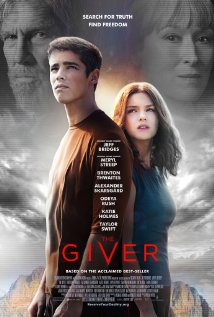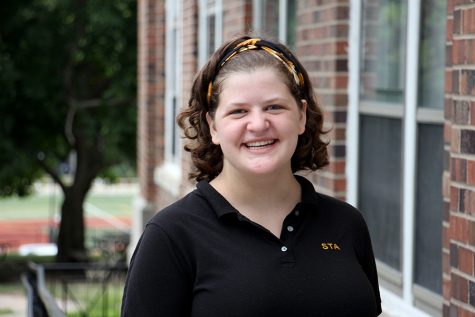The Giver does nothing but take
“The Giver” lacks authenticism and taste.

photo courtesy of IMDb
September 25, 2014
We begin with a sweeping shot of a large community entirely in black and white – which is the first problem.
The Giver, based on the book by Lois Lowry, tells the story of Jonas, a boy living in a dystopian society in the distant future. He is chosen to receive and store all the memories that society has “forgotten” over the years. In order to prevent conflict and encourage Sameness, the ever-present, all-knowing government has wiped the minds of its citizens clean of emotions, uniqueness and even color.
Now, if you’ve ever read the book, you may be thinking, “Wait a minute! That’s a huge spoiler!” But it’s not anymore. It’s on the posters, in the advertisements and even part of the summary on the movie’s website. This was the first thing I noticed in the trailer and the first thing that made me question the quality of this movie.
One of my favorite parts about the book was the sense that their lives had more differences from ours than were let on, followed by the discovery of the absence of color about halfway through the story. It was such a shock to discover how much of the citizens’ lives had been taken away by the government. In the movie, it’s immediately presented as a given fact, both by visuals and narration. It takes away a lot of the passion and disgust against their government that we as readers endured, if only to simplify the story and create the next blockbuster hit.
The film also took away many other pieces of the book for a “better movie experience” – namely, much of the character development. In the book, Jonas is an unassuming, fairly normal teenager devoid of ambition; the movie transforms him into a wildly upset force of nature, hell-bent on releasing the memories stored inside his mind. Fiona, a relatively small character in the book, is suddenly Jonas’ best friend and poorly developed love interest; the Chief Elder was also made much more important in the movie, probably due to her portrayer, the beloved Meryl Streep. His parents and sister were reduced to minor characters, his parents in particular shown as relatively cold and unfeeling simply to fit this underdeveloped model of Jonas’ Community. Also, his relationship with the newchild Gabe was pared down to less of a legitimate connection and more of an irrational urge to protect him.
This world is incredibly futuristic, with stylized furniture, holographic conversations and entire buildings composed of bright whites and shiny metals. It reminds me of recent dystopian movies such as The Hunger Games and Divergent. And here lies the main problem with this film: its unoriginality. The novel, published in 1993, was a major part of the creation of the modern dystopian genre. However, they waited 21 years to make this movie, thereby subjecting themselves to the public’s influence after saturation of dystopia stemming from the books inspired by this novel and other early dystopian fiction, such as Ray Bradbury and George Orwell. It mashed together the action-adventure-romance aspects of those stories – none of which were prominent in the book – to create yet another formulaic Hollywood cliche.
That’s not to say I didn’t like anything about the movie. I thought most of the acting was done well; I enjoy Meryl Streep in most everything, though I’m not a fan of Katie Holmes, who plays Jonas’ mother. Even Taylor Swift’s small cameo was pretty good. This might sound a little odd, but I loved the sound editing. All of the sci-fi effects, however needless they were to the plot itself, were mixed together really well. But even with these good qualities, the overall movie is an overworked, underdeveloped simplification of a beloved novel that puts far too much stock in the box office and far too little in true artistic value.




Louise Christianson • Oct 1, 2014 at 7:53 pm
That’s a very strong opinion, and I agree with it! Great job!
--------- • Sep 29, 2014 at 8:28 am
this is a great article madi and i applaud you for that. It has a very strong idea!
Congrats